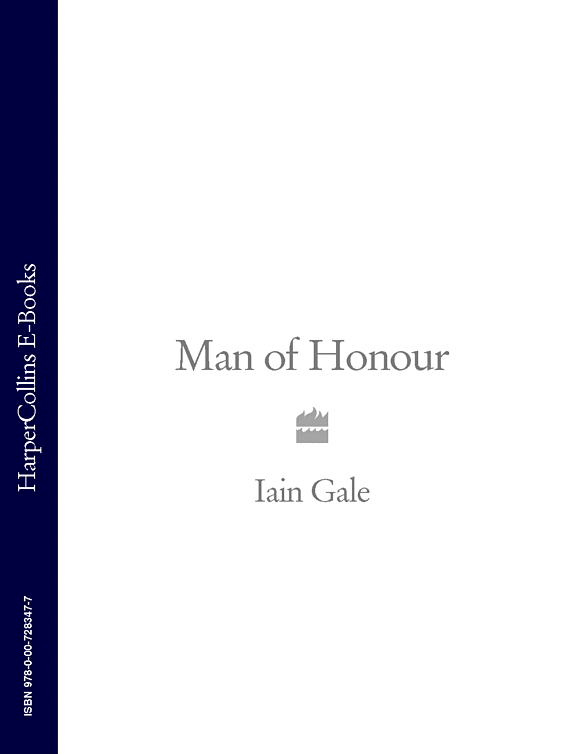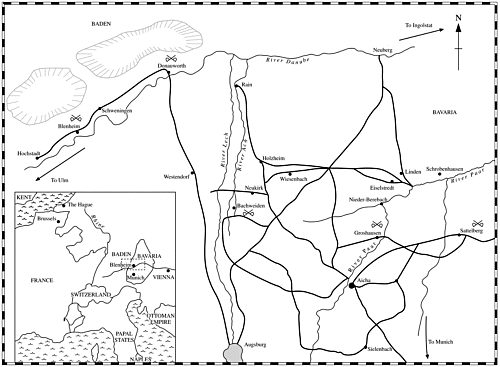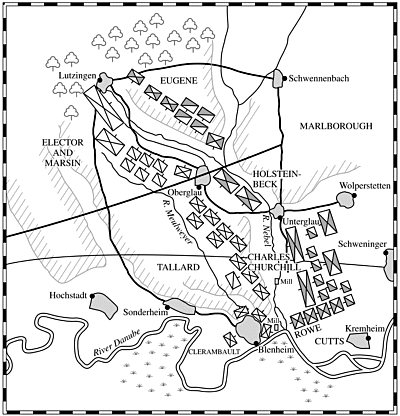Man of Honour
Authors: Iain Gale


IAIN GALE
Jack Steel and the Blenheim Campaign,
July to August 1704

For Sarah


Title Page
Dedication
Prologue
Chapter One
Chapter Two
Chapter Three
Chapter Four
Chapter Five
Chapter Six
Chapter Seven
Chapter Eight
Chapter Nine
Chapter Ten
Chapter Eleven
Epilogue
Historical Note
Rules Of War
Chapter One
About the Author
Also By Iain Gale
Copyright
About the Publisher
Upper Bavaria, July 1704
They had come here by stealth to carry the war deep into the south. An army of many nations: English and Scots, Hanoverians and Prussians, Hessians, Danes and Dutch. They had but one purpose: the defeat of France and her ally, Bavaria. The French King, Louis XIV, they knew to be a power-mad maniac, styling himself the Sun King. It was clear that he would not be content until he possessed all Europe, from Spain to Poland. And so it was, on this sultry day in early July, as afternoon drifted into evening, that fate brought these many thousands of men to Donauwö rth, a little Bavarian town with its ancient high walls and ramparts.
Above it, at the top of a steep slope, stood a fort whose hill, inspired by its distinctive shape, the local people had long ago christened ‘Schellenberg’ – The Hill of the Bell. It was abundantly and worryingly clear to all the soldiers who now stood in its shadow, that before any decisive victory could be won, before they could bring the French to battle, drive them back to Paris and remove forever the Sun King’s threat, that this hill and its little fort would have to be taken.
The tall young officer stood a few yards out in front of the company of redcoats and stared up at the fort that towered above them on the hill. For two hours now he had been awaiting the order to advance and with every passing moment the enemy position looked more forbidding. Like almost every man in the army, he had the greatest admiration and respect for his Commander-in-Chief. But at this precise moment he had begun to wonder whether, truly, this entire enterprise might not be doomed to failure. He tried to banish the thought. To maintain some degree of
sang-froid
before his men. But as he did so, the first cannonball fell in front of the three ranks of red-coated infantry, bounced up from the springy turf with grisly precision, and carried away four of them in a welter of blood and brains.
‘Feeling the heat, Mister Steel?’
The Lieutenant looked up. Silhouetted against the sun a tall figure in a full-bottomed wig peered down at him from horseback.
‘A trifle, Sir James.’
‘A trifle, eh? I’d have thought that you’d have been used to it after, how many years a soldier?’
‘Nigh on a dozen, Colonel.’
‘But of course. How could I forget? You earned your spurs in the Northern wars, did you not? Fighting the Rooshians. A little colder there I dare say.’
‘A little, Colonel.’
‘Can’t imagine why you should have wanted to go there at all. Narva, Riga? What sort of battles were those, eh?’
The question was not intended to have a reply.
‘Well, Steel, what think you of our chances today? Shall we do it?’
‘I believe that we can, Sir. Though it will not be easily done.’
‘No, indeed. Yet we must take this town. It is the key to the Danube and the gateway to Bavaria. And to do that we needs must take the fort. And we must do it by frontal assault. There is no other way. You would say, Steel, that the rules of war dictate we must do it by siege. And you would be right. But we have no siege guns and thus our Commander-in-Chief, His Grace the Duke of Marlborough, dictates that this is the way it shall be done. And so it shall. We will attack up that hill into the face of their guns.’
He paused and shook his head. ‘Our casualties will be heavy. God knows, Steel, this is not the proper way to win a battle. It will not be like any of the battles you saw with the Swedes, I’ll warrant. Eh? Rooshians and Swedes, Steel. Indeed I can’t fathom what you saw in it. No Rooshians today, Steel. Only the French and their Bavarian friends to beat. Still. Hot work, eh? Good day to you.’
Colonel Sir James Farquharson laughed, touched his hat to the young Lieutenant and trotted away down the line of the battalion, his voice echoing above the rising cannonfire as he shouted greetings to the other company commanders of the advance storming party:
‘Good afternoon, Charles. Good day to you, Henry. We dine in Donauwörth this evening, I believe.’
Steel shook his head and smiled. Yes, he thought. He could see why Sir James would not understand the reasons why he should have wished to fight with the Swedes. That it would never occur to his Colonel to take yourself off to find a war. Soldiering for Sir James Farquharson was a gentlemanly affair. A thing of parades and banners. But if there was one thing that Jack Steel had learnt in the last twelve years it was that there was nothing gentlemanly about war. Nothing whatsoever.
He turned his head towards his men. Saw the lines being redressed by the sergeants and the corporals, the bloody gaps filled up from the rear with fresh troops. The dismembered bodies being dragged away.
‘The Colonel seems happy, Sir. Do you suppose he thinks we’re going to win?’
The surprisingly mellifluous voice belonged to Steel’s Sergeant, Jacob Slaughter. Six foot two of Geordie and the only man in the company broader and taller than Steel himself. Gap-toothed, loose-limbed Sergeant Slaughter, who had run away to join the colours to avoid being sent to work in the new coal mines of County Durham. Towering Sergeant Slaughter who was so terrified of small spaces, who couldn’t abide the dark and was unutterably clumsy in all manner of things. But who, on the field of battle was a man transformed, as skilled and calculating a killer as Steel had ever encountered. A man next to whom, more than any other, you would want to stand when all around you the world had dissolved in a boiling surf of blood and death. Steel greeted him with a smile.
‘D’you need to ask, Jacob? Sir James doesn’t think we’ll win. He knows it. Our Colonel raised this regiment, his regiment
with his name, from his own pocket. He wants us to be the finest in the British army. It’s not just our lives that’ll be at stake up there. It’s his money and his pride. He needs a few battle honours. And it’s up to us to give them to him.’
‘D’you think we’ll be going in soon then, Sir? I’m startin’ to get a dreadful thirst.’
‘By God, Jacob. That thirst of yours is no respecter of time and place. Here we stand, about to launch possibly the most desperate feat of arms to which you or I have ever been party – and quite probably our last – and you tell me you want a drink. I tell you, Sarn’t, there’ll be drink a plenty if we take this damned town. Don’t you worry. I’ll personally find you a cask of the finest Moselle.’
‘You’re as fine a gentleman as I’ve ever known, Mister Steel, and I’ll take you at your word. But if you really mean it, Sir, I’d sooner have a barrel of German ale than any bloody wine – if it’s all the same with you.’
He paused. His attention drawn by sudden movement towards the right of the line.
‘Aye aye. Looks like we might be on the move.’
Following his Sergeant’s gaze, Steel saw a galloper. A young Cornet of Cavalry mounted on a handsome black mare, racing at speed down the lines. Here then, at last, was the order. And not before time. They had marched, halted and been ordered at stand-to since three o’clock that morning. Now it was nearing six in the evening. Surely now they must go. The men were restless. They would not stand for much more delay, or they would lose their nerve. Steel looked about him. Back down the slope he was able to see the massed battalions and squadrons of the main army, including the other ten companies of his own regiment.
Guidons and colours flew from their spear-topped poles, high above serried ranks of red, blue, grey, brown, and green
as the allies assembled their might to follow into the gap that it was confidently presumed would be made by the storming party.
It was more evident than ever, he thought, what a rag-bag army this was. English, Scots, Irish, and an unlikely union of Dutchmen, Hessians, Prussians and Danes. Walk through their camp and you would find men communicating with each other by sign language, or attempting some laughable
patois
. Steel, ironically, had always found that the easiest language to use – that most understood by his allied counterparts – was the French of their enemies. He wondered how the allied army would hold together under fire. Oh, he did not doubt the Duke’s capabilities with their own contingent. But how would so many foreigners suffer being commanded by an Englishman? Nevertheless, you could not help but admire the sight.
‘A fine view, Jack, is it not?’
Steel’s fellow officer, Lieutenant Henry Hansam, was standing beside him, holding open a small silver snuff box.
‘Care for a pinch?’
Steel waved him away. Hansam took a good pinch and inhaled deeply before continuing:
‘Although little good it does us. We are quite alone up here. They expect a miracle of us, Jack. Nothing less than a miracle.’
He let out a loud sneeze, withdrew a silk handkerchief from his sleeve and wiped his nose. Steel spoke.
‘Well, Henry. Can we manage it? Shall we give them their miracle?’
‘We are the choice troops, you know. If we cannot take this position then most certainly it cannot be achieved. We are the chosen few. Forty-five times one hundred and thirty men, plucked from each English and Scots battalion on this
field. The Duke himself has had a hand in our choosing. Naturally Sir James sends only his Grenadiers. And why not? It is the very purpose for which the Grenadiers were created. We are the “storm” troops. We have the height, the agility, the strength. And, by God Jack, you know we have the heart to do it.’
Steel cast a sideways look at their company. They were giants among men. Not one among them under five foot ten. They had been chosen, too, for their experience and skill with arms; their ability to move fast and to operate on their own initiative.
They were the finest infantry in Queen Anne’s army and soon he would lead them forward, up the hill and, God willing, into the fort. To death or glory and the promise of a handsome bounty. Looking up again at the dark mass of the fort, Steel could not suppress a chill shudder of apprehension. He looked away and pretended to straighten his sash. Hansam sneezed again through his snuff, wiped his nose with the now discoloured square of silk.
Steel looked at his friend, who, along with him, bore the title unique to the Grenadiers of ‘Second Company Lieutenant’. With Colonel Farquharson keen to draw for himself the additional pay that came with the nominal command of their company, Hansam and Steel between them found that they now commanded the Grenadiers in the field yet without the status or pay of a captain. Nor had they any junior officers.
Their last Ensign, a weak-livered boy of fifteen, had left them at Coblenz – invalided out with chronic dysentery. As yet they had found no replacement. Steel spoke, quietly:
‘Of course, there is the bounty money.’
Hansam raised his eyebrows.
‘Of course, Jack. We cannot delude ourselves that the men will do it entirely for the love of Queen and country. Nor
even, dare I say it, for love of the Duke. Keep them happy and they’ll fight. Oh yes. They’ll fight. For the bounty.’
‘I was talking, Henry, about our own share.’
‘Oh.’
Hansam paused, then grinned.
‘Naturally, my dear fellow. Of course. We may profit too. Point of fact, I never did understand quite how someone as financially limited and indeed as frugal as yourself, had ever come to have started off in the Foot Guards. Although perhaps now I do see your reasons for transferring from that illustrious regiment to join our happy band.’
Steel nodded his head. Hansam spoke again, smiling:
‘Perhaps, Jack … if we should survive, I might persuade you to accompany me to a proper tailor, in London. I mean take a look at yourself, Jack. Why, your hat alone …’
Steel looked down at the hat which he held in his hand. Unlike some Grenadier officers, he did not choose to wear the mitre cap, but preferred his battered, gold-laced black tricorne. In fact he habitually fought bareheaded. And anyway, at six foot one, as the second tallest man in the company, he knew that a Grenadier’s mitre cap would have made him look less frightening than absurd. Besides, the most precious lesson he had got from twelve years of soldiering, nine of them with the colours, was that to survive as an officer you should not offer the enemy too obvious a target and yet at the same time must be sufficiently distinctive to be instantly recognisable to your own men.
‘Well, Henry. It does let the men know where I am.’
Hansam laughed. For both officers knew that, with or without his hat, his men could hardly mistake Steel. Apart from his height, there was his hair, which rather than cutting short and covering with a full wig, as was the fashion, he preferred to wear long and tied back in a bow with a piece
of black ribbon: another practical trick learnt on the field of battle.
‘I say.’
Hansam was pointing along the line.
‘We appear to be under orders.’
Steel could see that the galloper had reached the senior commanders of the storming party now. They had dismounted, as was common practice, to lead the attack on foot. He could make out Major-General Henry Withers and Brigadier-General James Ferguson, commanders respectively of the English and Scots troops of the assault force. Beside them stood the determined figure of Johan Goors, the distinguished, middle-aged Dutch officer of engineers, well known for his opposition to Baden, to whom Marlborough had entrusted overall command of the assault.
The officers had gathered near, although not too close, to the ‘forlorn hope’, a band of some eighty men – volunteers all, drawn from Steel’s old regiment, the First Foot Guards – whose unhappy task, as their name suggested, was to go first into the defences and discover by their own sacrifice where the enemy might be strongest. To put it bluntly, they would draw the enemy’s fire on to themselves. Most of them would die. But for those who survived there would be the greatest rewards and celebrity. Immortality even. At its head Steel saw the unmistakeable tall and handsome Lord John Mordaunt. The two had served together for a time and Steel had been somewhat surprised last year when Mordaunt had been refused the hand of Marlborough’s daughter. Perhaps the honour of leading the ‘hope’ now was some self-inflicted penance for that amorous failure. Or Mordaunt’s last chance possibly to win the admiration of the man who might have been his father-in-law. From the right, a squadron of English dragoons now approached their line. Steel noticed that each
trooper carried in front of him across his saddle two thick bundles of what looked like sticks, tied together with rope. The cavalry broke into open order and began to ride between each rank of the Grenadiers, handing out the bundles of fascines, one to each man. To the officers too. Steel took his own realizing how cumbersome it was. These though were the vital tools that they were to use to cross the great defensive ditch that they had discovered lay in their way at the top of the hill, a short distance in front of the breastworks.
A thunderous roar made Steel turn momentarily and up on the gentle hill behind them he saw flame spout from the mouths of ten cannon. The sum total of the allied artillery had been stationed there, close to a small village set afire by the French in an attempt to impede their progress. Ten guns. That was all that they had to soften up the defences that lay above them. The balls flew over their heads and disappeared high up on the enemy position. Well, it appeared that at least someone in the high command was trying to prepare the way for their assault.
